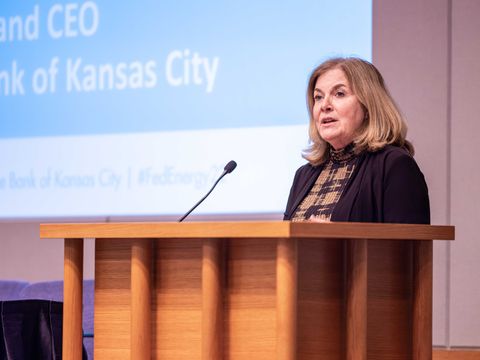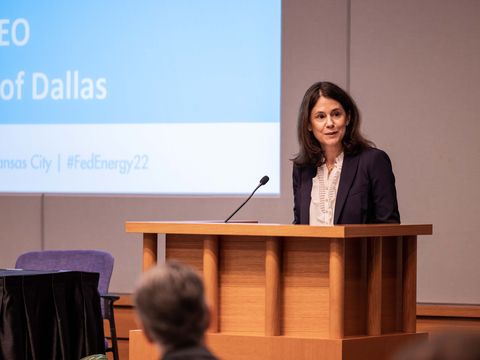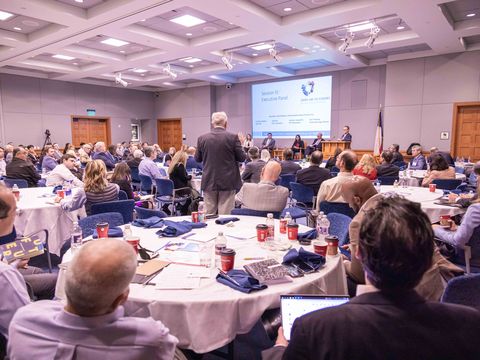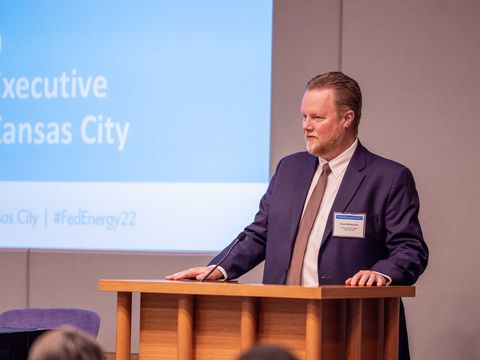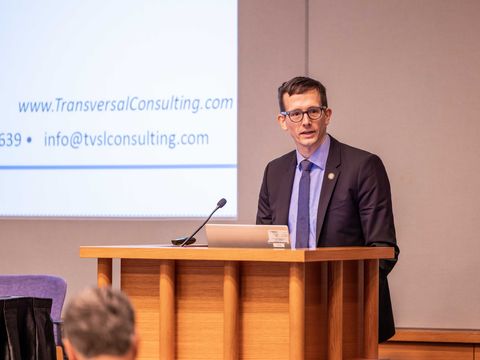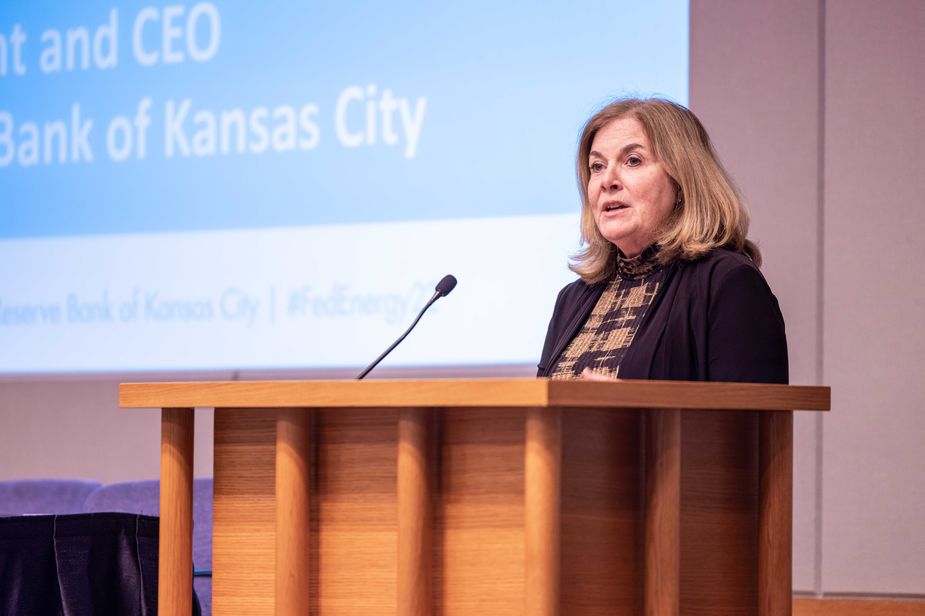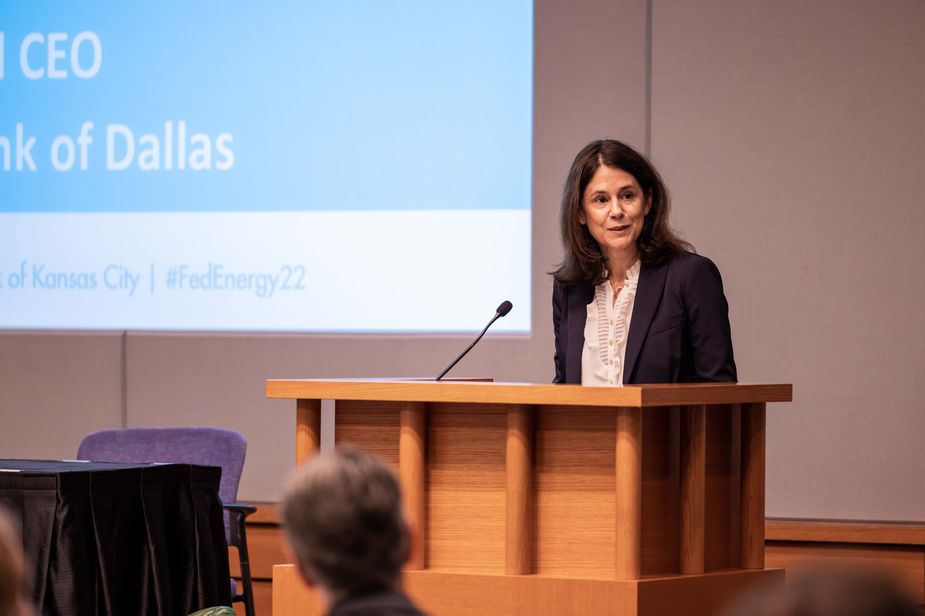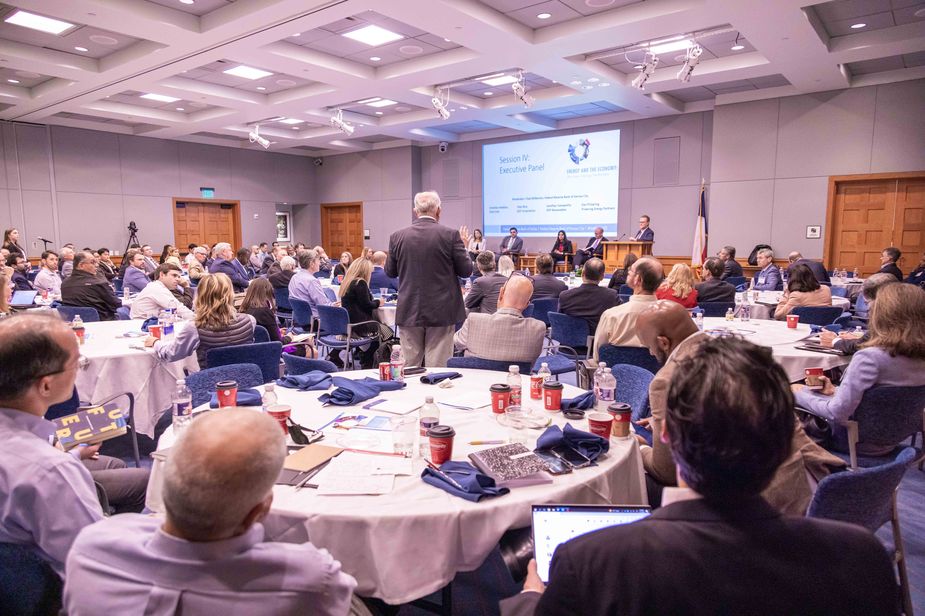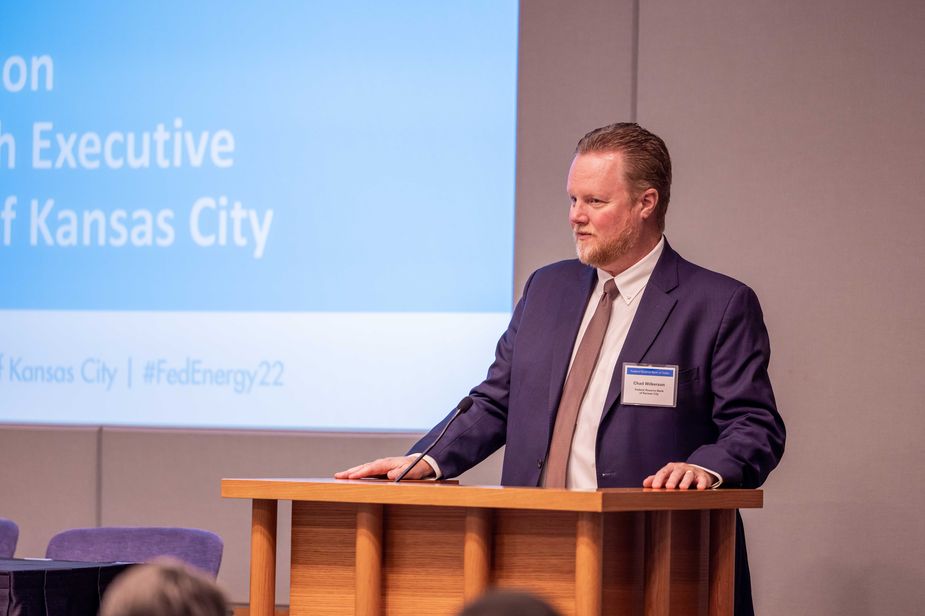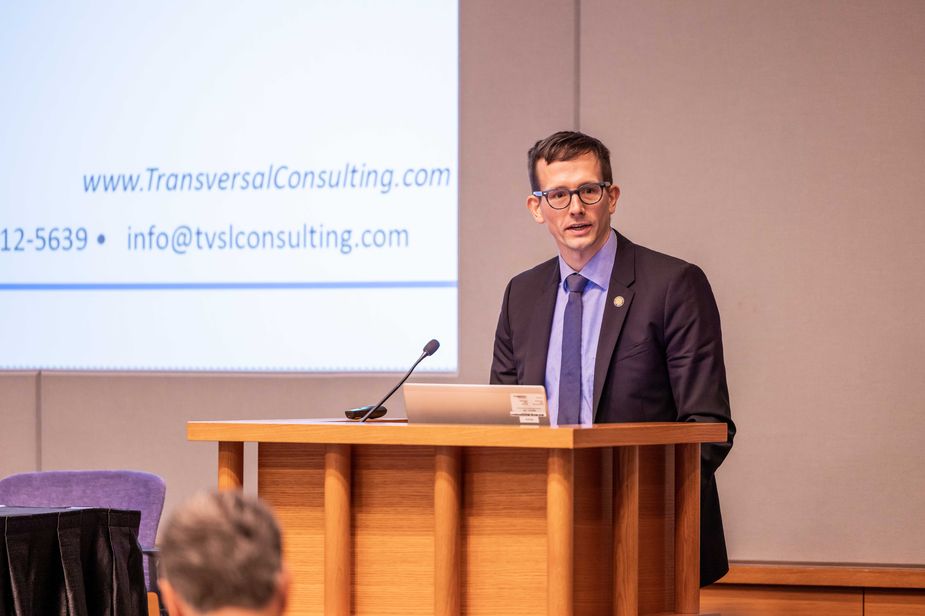Nearly 1,000 online and in-person attendees from 24 countries engaged in conversation around shifting geopolitics, the transition to renewable energy and supply constraints at External LinkEnergy and The Economy: The New Energy Landscape, a conference hosted by the Federal Reserve Banks of Dallas and Kansas City. Now in its seventh year, the 2022 conference was held as a hybrid event in Houston.
During the Nov. 10 event, industry leaders, bankers, government officials and academics discussed the emerging outlook for global energy markets and the U.S. energy sector. Each year, the event highlights the critical role energy plays in the economy, said Esther George, Kansas City Fed President and CEO. That was clearly the case in 2022.
“Energy is often in the spotlight given its central role in the economy, but the events of this past year have only further reinforced the importance of energy to our region, the economy, and the backdrop for conducting monetary policy,” said George.
In one of her first public speeches as President and CEO of the Dallas Fed, Lorie Logan spoke about the crucial role energy plays in the Tenth and Eleventh Federal Reserve Districts, which together produce almost half of the United States’ energy.
“A deep understanding of the energy ecosystem is critical so the Federal Reserve can best accomplish core elements of our mission: setting monetary policy to promote maximum employment and stable prices, promoting the stability and efficiency of the financial system, and supporting community development,” Logan said.
Energy and the Economy: The new energy landscape
The Federal Reserve Banks of Dallas and Kansas City hosted their seventh joint energy conference on November 10 in Houston. The conference focused on geopolitics as well the outlook for global energy markets and the U.S. energy sector. Participants include business leaders, central bankers, government officials, academics and financial market representatives.
External LinkClick here to see the full agenda for the program. Continue reading for a summary of the 2022 conference sessions.
Session I: Shifts in Energy Geopolitics
Over the last year, the Russia-Ukraine war and subsequent sanctions affecting Russian energy output highlighted geopolitics’ role in energy policy. Speakers during the conference’s first session, “Shifts in Energy Geopolitics,” said that conflict was only one part of the story. Much of the world is still operating under an old paradigm where there are clear differences between producers and consumers, said Ellen Wald, president of Transversal Consulting.
“That paradigm has undergone a major shift in the last decade,” she said. “The relationships are no longer that clear cut and simple.”
Brenda Shaffer, of the Naval Postgraduate School, said that geopolitical threats to energy infrastructure impact natural gas more than other fuels, given that it is more difficult to transport, and countries are lagging behind in natural gas policy. Colorado School of Mines Professor Morgan Bazilian added that viewing energy through the lens of national security could be beneficial, as many materials needed for the energy transition are dependent on strong and open global trade flows.
“Everything in policy is about priorities,” he said, “and priorities change rapidly in politics.”
Ellen Wald - 2022 Energy and the Economy conference
Ellen Wald, president of Transversal Consulting, talks about how geopolitics are affecting global energy markets at the 2022 Energy and the Economy conference.
External LinkClick here to read the Kansas City Fed’s latest research exploring the impact on outputs of the Russian energy sanctions.
Outlook for Global Energy Markets
Other speakers provided insight into the current dynamics over energy supply and demand.
Abhi Rajendran, director of oil markets research at Energy Intelligence, said that the energy sector has been in a “just in time” market, which would lead to more price and supply volatility.
“We’re underwater on the supply side and that’s with demand still pent up coming out of COVID,” he said.
Natural gas demand and prices will likely continue to increase going forward, said Ademiju Allen, Rystad Energy analyst. While higher prices are good for allocators, he explained unknown variables like winter severity and shifting geopolitics bring a level of caution.
“We’ve always had an issue where we’re considering winter in the United States. Now we’re considering winter in the United States and the European Union,” Allen said.
Anish Sethia, global head of commodities, energy and environmental markets at BloombergNEF, spoke about the global outlook for renewable energy. He said that while there are record investments in green energies like solar and wind, the funding would need to be much higher to meet net zero goals for emissions. While net zero commitments are good to have, he said, meaningful policy and investment are necessary for actionable change.
Take a look inside the 2021 Energy and the Economy topic, "External LinkOpportunities and Challenges of the Energy Transition," with real-world connections.
Testing the Limits of the US Energy Sector
Speakers representing the U.S. energy sector were largely in agreement that demand for energy would grow in the near and long term. They also did not expect legacy fuels to disappear as the energy transition to renewable sources occurs.
Shifting geopolitics, regulatory issues and environmental uncertainty in the industry were contributing to constrained capital and price inflation, they said. Given that demand for energy is only likely to increase, all three presenters in this session stated they were cautiously optimistic for the sector despite their concerns.
Sandhya Ganapathy - Energy and the Economy conference 2022
Sandhya Ganapathy, CEO of EDP Renewables North America, discusses the outlook for renewable energy at the 2022 Energy and the Economy conference.
Panel Discussion with Executives on the Changing U.S. Energy Landscape
The last few years have brought an onslaught of challenges to the energy sector, according to energy company CEOs in the conference’s last session. Considering the global impacts of COVID-19, the Russia-Ukraine war and supply chain issues, volatility has been especially high. That volatility, some panelists said, has made the industry more interested and invested in accelerating the energy transition.
“I think when the generations look (back) at this point, that this will be the transitional moment,” said Sandhya Ganapathy, CEO of EDP Renewables North America.
“It’s no longer about the climate crisis alone. It’s a matter of security, a matter of affordability, it’s a matter of independence.”
Executives in the last session all echoed the same message: this moment in time brings opportunities for innovation, security and to bring the global marketplace forward.
Takeaways from the 2022 Energy and the Economy conference
Chad Wilkerson, economist and Oklahoma City Branch Executive for the Federal Reserve Bank of Kansas City, and Kunal Patel, senior business economist at the Federal Reserve Bank of Dallas, discuss takeaways from the 2022 Energy and the Economy Conference
Dig Deeper
Learn more about the External Link2022 Energy Conference. Stay engaged by keeping up to date with the latest research on energy and the economy from theExternal Link Kansas City and External LinkDallas Fed. The 2023 Energy Conference will take place next fall in Oklahoma City.

